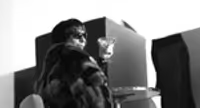Next to Normal and its depiction of bipolar disorder.
brightasyellow
Understudy Joined: 7/7/10
#1Next to Normal and its depiction of bipolar disorder.
Posted: 7/7/10 at 2:53pmI have yet to see this (the tour is coming to L.A. in September), but I'm interested in how the show treats the subject of Diana's bipolar disorder?
#2Next to Normal and its depiction of bipolar disorder.
Posted: 7/7/10 at 2:54pmYou're going to open up a lot of spoilers here.
brightasyellow
Understudy Joined: 7/7/10
#2Next to Normal and its depiction of bipolar disorder.
Posted: 7/7/10 at 3:09pmI've read a summary of it; is it okay to talk about spoilers?
#3Next to Normal and its depiction of bipolar disorder.
Posted: 7/7/10 at 4:28pmIf you write SPOILER ALERT in the thread title, it's okay, lol. What do you mean by how it treats her disorder? Like examples of when/how it's mentioned, or things that happen as a result of it, and the treatment?
Phyllis Rogers Stone
Broadway Legend Joined: 9/16/07
#4Next to Normal and its depiction of bipolar disorder.
Posted: 7/7/10 at 4:30pmI assumed he meant realistically or not.
Dollypop
Broadway Legend Joined: 5/15/03
#5Next to Normal and its depiction of bipolar disorder.
Posted: 7/7/10 at 4:41pmBi-polarity is difficult for the person who suffers from it and for those around him or her. Our pastor has been very open about his bi-polar condition and we're aware of it and sympathize with him. However, it's a really Jekyll and Hyde situation and we never know whether we'll be talking to Jekyll or Hyde.
#6Next to Normal and its depiction of bipolar disorder.
Posted: 7/7/10 at 5:18pmAfter actually dealing with someone who was bipolar, I found N2N to be a Lifetime Television for Woman version of it.
#7Next to Normal and its depiction of bipolar disorder.
Posted: 7/7/10 at 5:26pmOh. Well, I'm not too familir with the details of bipolar disorder, the depression; however, I've had experiences with. I think that Diana's feelings about her medication are very real, and honest.
chellie
Stand-by Joined: 6/7/10
#8Next to Normal and its depiction of bipolar disorder.
Posted: 7/7/10 at 5:26pm
After actually dealing with someone who was bipolar, I found N2N to be a Lifetime Television for Woman version of it.
...Are there actually any Lifetime movies geared toward men? I thought the for women was always implied ![]()
There are tons of different ways bipolar people present the illness. Saying "this isn't how so-and-so acts" isn't necessarily accurate. Though, of course, I will agree that it's presented more dramatically than probably 99.99% of cases for the sake of the storyline - but, like with most storylines, wouldn't it be much less driving if it was TOO realistic?
#9Next to Normal and its depiction of bipolar disorder.
Posted: 7/7/10 at 5:51pm
chellle, that is their very own tag line!
Should be "Television for Women and Gay men who love Golden Girls!":)
SporkGoddess
Broadway Legend Joined: 7/27/05
#10Next to Normal and its depiction of bipolar disorder.
Posted: 7/7/10 at 6:53pm
(I've actually seen the show now, so hopefully I will not get slammed)
Spoilers ahead:
It's pretty accurate, for the most part. It depicts more depression than mania, though.
The most unrealistic part is her delusions. I'm still not sure if Gabe is meant to be a hallucination or a delusion. If he's meant to be a hallucination, it's very unrealistic. If he's just representing a delusion, it's more realistic. Though one nitpick: delusions with bipolar tend to be mood-congruent, and Diana's aren't.
#11Next to Normal and its depiction of bipolar disorder.
Posted: 7/7/10 at 6:57pmIt really is a Lifetime movie version of it. Although the show could never be called "happy" the actual effects of what happens--especially when the person with bipolar goes off her meds are often far worse than what happens in the show. That said, it's still a pretty good show.
#12Next to Normal and its depiction of bipolar disorder.
Posted: 7/7/10 at 7:50pmWell they do say in the show that sometimes it's easier to assign a name to something when trying to diagnose a problem, so Diana's whole issue isn't necessarily bipolar disorder.
SporkGoddess
Broadway Legend Joined: 7/27/05
#13Next to Normal and its depiction of bipolar disorder.
Posted: 7/7/10 at 7:56pm
She meets criteria for it though, assuming that she actually has had a manic episode (Natalie references one, I believe).
I can't think of any other disorder that fits her symptoms better.
#14Next to Normal and its depiction of bipolar disorder.
Posted: 7/7/10 at 8:31pmShe does, but maybe there are underlying issues as well that aren't a result of bipolar.
#15Next to Normal and its depiction of bipolar disorder.
Posted: 7/7/10 at 8:33pm
alliez92092,
you do bring up a good point.
I have a personal history of mood issues. One of my doctor's who ended up not being a good fit for me jumped the gun and thought that right way I was bipolar because I fit a couple of the criteria that would be associated with it. Another doctor who I am still currently working with and is a much better fit for me told me that sure, I may have some of the same symptoms as someone with bipolar but it doesn't mean that that is what I have.
It is easier for people to attach a label to something right away just to make a problem more tangible when in fact it might do the opposite.
#16Next to Normal and its depiction of bipolar disorder.
Posted: 7/7/10 at 8:34pmI think Diana also has some schizophrenic tendencies, as Dr. Madden implied.
SporkGoddess
Broadway Legend Joined: 7/27/05
#17Next to Normal and its depiction of bipolar disorder.
Posted: 7/7/10 at 8:40pm
In order to figure out if she's schizophrenic, you'd have to first determine whether or not the psychotic symptoms are exclusively occuring during a mood episode.
Also, you'd have to rule out schizoaffective disorder. From my own personal experience, she comes across as more bipolar than schizophrenic to me. She doesn't have any of the negative symptoms associated with it, or the thought disorder.
Sorry, I love diagnosing fictional characters. ![]()
#18Next to Normal and its depiction of bipolar disorder.
Posted: 7/7/10 at 8:50pm
SPOILER ALERT:
Diana experiences a manic episode during the song, "It's Going to Be Good." - she talks about rewiring the computer, re-tiling the roof, and generally runs around like she's crazy-happy (which, in fact, she is). At the height of her mania, her delusion/hallucination of Gabe returns to her.
Generally speaking: I'm a practicing psychologist. I think that Diana's mental illness is accurately, if hyper-dramatically, portrayed. Do Kitt/Yorkey employ some cliches of mental illness in the book and score? Yes. Do I find that problematic in terms of what's necessary to create a deeply textured and multifaceted character on stage? No.
SporkGoddess
Broadway Legend Joined: 7/27/05
#19Next to Normal and its depiction of bipolar disorder.
Posted: 7/7/10 at 8:51pmI remember that, but thought it was odd because shortly after that she was depressed. Usually bipolar doesn't involve that extreme of emotional lability. I guess she could be rapid-cycling, though.
brightasyellow
Understudy Joined: 7/7/10
#20Next to Normal and its depiction of bipolar disorder.
Posted: 7/7/10 at 9:38pm
I ask because I have bipolar disorder and hope that it depicts the illness accurately and without romanticizing it.
Hallucinations are definitely a part of the illness. And rapid-cycling or ultraradian cycling are also common.
SporkGoddess
Broadway Legend Joined: 7/27/05
#21Next to Normal and its depiction of bipolar disorder.
Posted: 7/7/10 at 9:53pmI know that hallucinations are part of bipolar, but the nature of Diana's hallucination (assuming Gabe is one) is not very accurate. Visual hallucinations are extremely uncommon.
#22Next to Normal and its depiction of bipolar disorder.
Posted: 7/7/10 at 10:21pm
r, but the nature of Diana's hallucination (assuming Gabe is one) is not very accurate.
It's a musical! A musical with a bipolar theme isn't going to follow the DSM-IV word for word. If someone is looking for a completely accurate portrayal of bipolar disorder, then look elsewhere.
Updated On: 7/7/10 at 10:21 PM
#23Next to Normal and its depiction of bipolar disorder.
Posted: 7/7/10 at 10:33pmAgree with Ljay, plus Gabe is ultimately a very symbolic character (SPOILER ALERT: There's a reason why Dan sees him at the end, and I don't think you're supposed to think Dan is bipolar too or anything of the sort), there's no need for a scientific explanation behind the character, it's a device that has been used extensively throughout theatre, especially musical theatre which always presents a heightened sense of reality.
#24Next to Normal and its depiction of bipolar disorder.
Posted: 7/7/10 at 10:38pmI don't think the disease is romanticized as much as it's dramatized, if that makes any sense. They do they're best to stay true and factual, but it is a musical so not everything is to the letter.
Videos










